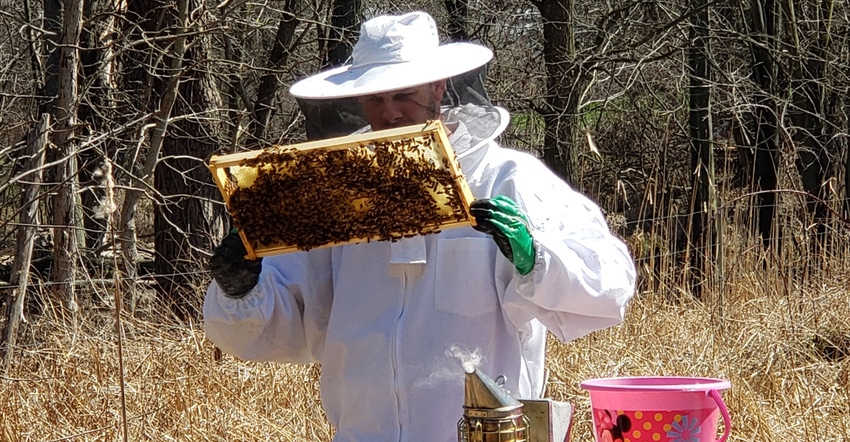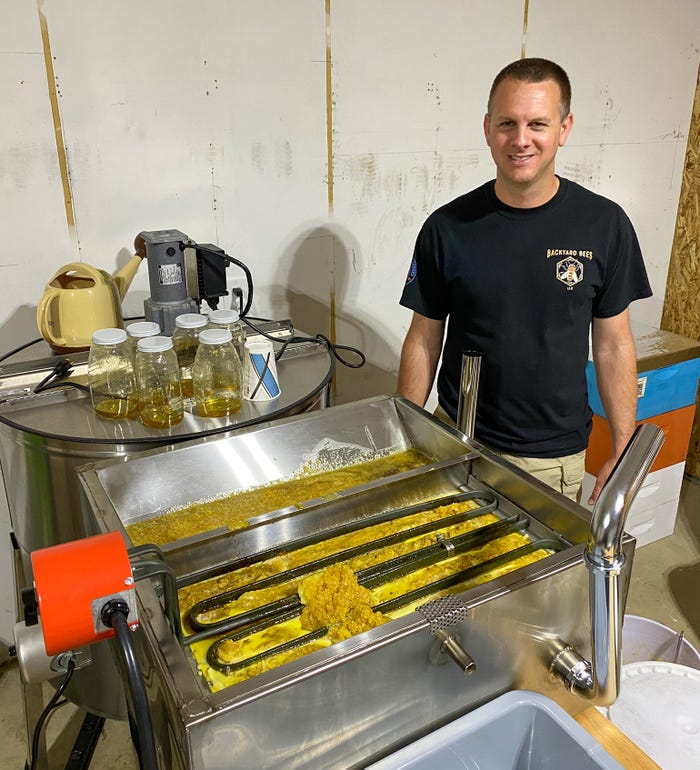
Editor’s note: This is the first in a series of stories highlighting the Farmer Veteran Coalition and its 2021 Farmer Veteran Fellowship Fund grant awardees. Coalition grants provide money for veterans to help feed the world.
Michael Henson will straight-up admit it; he’s afraid of being stung. At 12, he was stung in the ear by a yellow jacket. But undoubtedly leveraging some of his military training, Army veteran Henson overcame his fear and became a beekeeper five years ago.
He’s been stung nine times, and while he doesn’t like it, “it’s part of the job,” says Henson, 44, who is taking baby steps starting out while maintaining another full-time job.
More and more veterans are finding a good fit with various kinds of agriculture, and organizations and companies are reaching out to help them succeed.
“Agriculture provides a sense of mission,” Henson says. “You really don’t have a true sense of mission when you’re working for someone else; you have their mission — at least in my case.” Beekeeping provides a purpose, he adds, and the opportunity to draw on core military skills such as motivation, discipline, dedication and determination to accomplish a goal.
His company Backyard Bees in Davison, Mich., about 10 miles east of Flint, was recently awarded a national 2021 Farmer Veteran Fellowship Fund grant of $2,000, which was used to purchase a piece of equipment to extract honey otherwise not harvestable.
Grants are awarded by the Farmer Veteran Coalition, which was formed in 2008 as a nonprofit working with military veterans in all 50 states and U.S. territories to mobilize veterans to feed America. FVC has also developed a nationally recognized Homegrown By Heroes label for veteran-grown products.
“Our goal is to help active duty and veterans achieve their agricultural dreams, whether that is getting technical assistance through training workshops and webinars, or connecting them with mentors, finding land, or purchasing equipment or animals, and more,” says Rachel Petitt, program director for FVC. “The Fellowship Fund is our premier program. Since it launched in 2011, we've given about $4 million through small grants of $1,000 to $5,000.”

NEW EQUIPMENT: Michael Henson, owner of Backyard Bees in Davison, Mich., was one of several recipients of Farmer Veteran Fellowship Fund grants, awarded by the Farmer Veteran Coalition. The grants are designed to buy equipment or other startup needs for veteran farmers. Here, Henson stands next to the mini wax melter purchased with the grant. It allows him separate the wax from the honey.
The competitive grant program, which partners with Tractor Supply Co., Wounded Warrior Project and others for funding, will open applications in early 2022.
“Even though the dollar amount may seem small, it's these crucial small pieces of equipment that really make the difference in the first few years of someone starting a farm operation,” Petitt says. “So, something like a walk-behind tractor can help someone make the leap from all hand cultivation to using motorized tools, which can help them scale up without having to finance a larger tractor.
“Or, it might be supplying a pregnant heifer, which will grow the herd exponentially into the future. We purchased pregnant heifers for a rancher in Texas seven years ago as their very first animals, and now he has 200 head.”
Funding in the beginning can allow for growth that leads to more profitability and efficiency, and often, more safety.
“We partner with Tarter USA for American-made livestock equipment, like humane cattle shoots that reduce stress on animals and make it safer for both the animal and the farmer for procedures like checks for pregnancy, illness, lameness or for shots,” Petitt says. “That piece of equipment is about $5,000, which may not be a priority for ranchers if they didn't receive funding like this.”
For 2021, the program awarded about $400,000 to more than 100 veterans.
“Through the years. we’ve purchased things like irrigation supplies, greenhouses, well-drilling services and livestock coops,” Petitt adds.
The program also has a partnership with Kubota Tractor called Geared to Give, where Kubota donates five larger pieces of equipment, such as tractors or ATV.
Learn more at farmvetco.org or follow on Facebook or Instagram at @FarmerVeteranCoalition and Twitter at @FarmVetCo.
To sponsor equipment for the Fellowship Fund, email Rachel Petitt at [email protected].
To donate to support farmer veterans directly, visit farmvetco.org/donate or text GIVE and the dollar amount to 270-838-3276 (270-VET-FARM).
Farmer Veteran Fellowship Fund grants
Here is a list of people eligible for the grants:
veterans of any branch of the U.S. military from all service eras, including active duty
those with “honorable” discharge
must have an agricultural business in operation and a functional business plan
must be willing to fully participate in the Fellowship Program, which includes periodic progress reports, mentoring other farmer veterans and a desire to make a positive impact on the farmer veteran community
Application
The application, which consists of both short answer and essay questions, is comprised of five main focus areas: military service, educational background, prior farming experience, business and financial planning, and short-term and long-term goals. A tutorial video on the website guides applicants through the process, which will open just after the 2022 new year.
Applicants are evaluated based on the following criteria:
farm training and experience or transferable skills
personal investment in their farm business
strength of funding request and ability to show how an award will help grow their farm business
vision and goals for the future of their business
community involvement
Upon notification of their award, fellowship recipients may begin seeking out third-party vendors to make their purchase. Funds are sent directly to vendors, not the recipients.
About the Author(s)
You May Also Like






